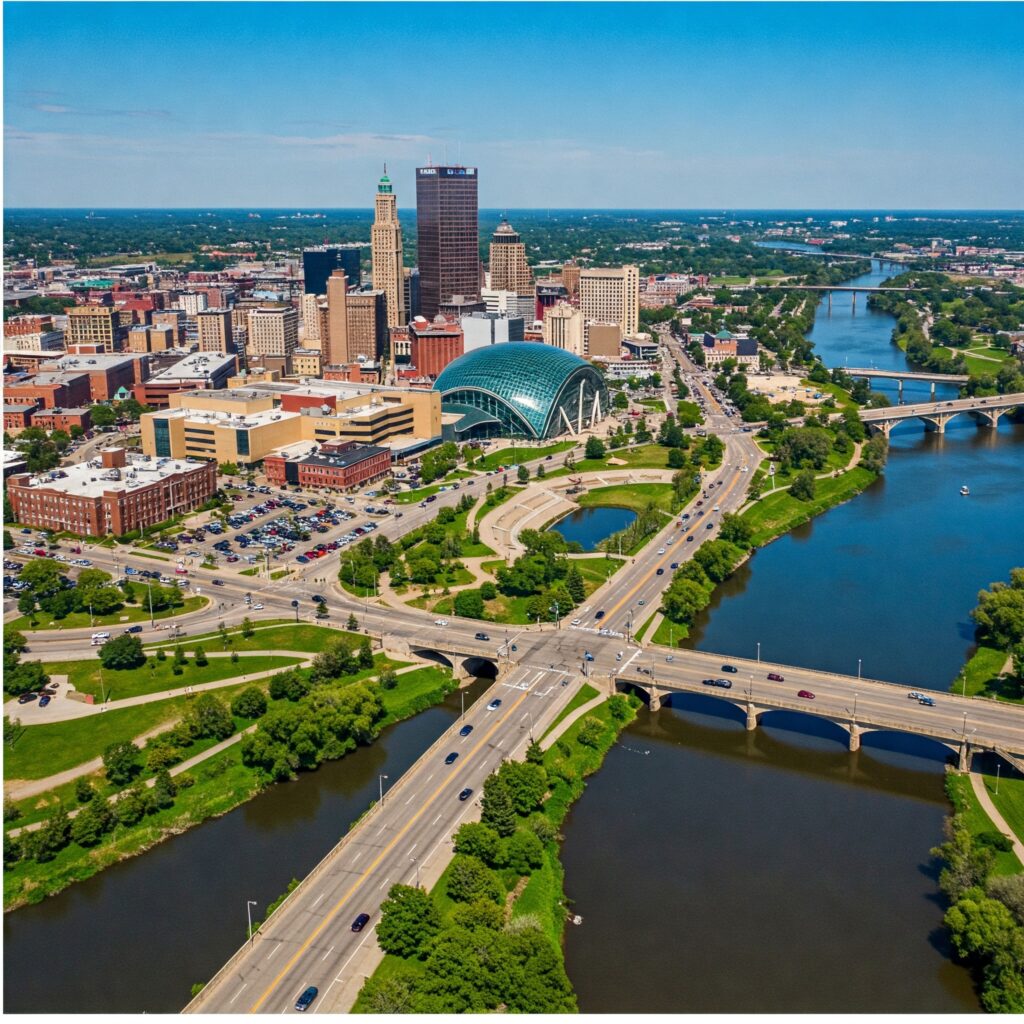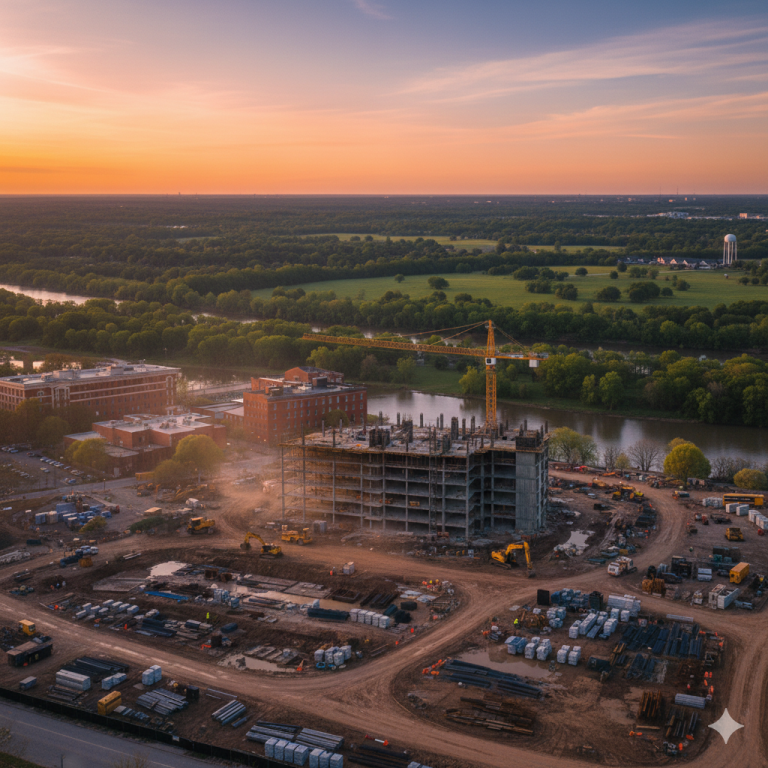Contributing Author & Editorial Review
This article was crafted and reviewed by experienced professionals to ensure accuracy and practical insight.


DSCR Rental Loan Highlights
- Qualification based mainly on property cash flow (DSCR).
- No personal income docs required for many programs.
- Financing for 1–8 unit rentals, portfolios, and many STR/Airbnb deals.
- Up to 80% LTV on purchases and 75% LTV on cash-out (program-dependent).
- 30-year fixed and interest-only options available.
Environmental Impact & Climate Resilience Strategies in Minneapolis Real Estate – 2025 Guide
The year 2025 marks a pivotal inflection point for Minneapolis real estate professionals as Environmental, Social, and Governance (ESG) principles and climate resilience rapidly redefine what it means to develop, operate, and invest in property. With Minnesota’s changing climate, proactive carbon reduction, climate risk assessment, and green building practices are now at the core of sustainable investing in Minneapolis real estate. ESG compliance and forward-looking implementation rates are surging, driven by stringent city mandates, robust investor demand, and a sophisticated local ecosystem of sustainability expertise. This guide delivers a comprehensive analysis of ESG adoption in Minneapolis, examining market trends, regulatory pressures, ROI benchmarks, and best practices for carbon-neutral and climate-resilient buildings. Tailored for institutional investors, property owners, and sustainability leaders, it provides actionable strategies, evaluation criteria, and a roadmap to unlock ESG investment opportunities and future-proof real estate assets in the Twin Cities.
- Environmental Impact & Climate Resilience Strategies in Minneapolis Real Estate – 2025 Guide
- Environmental Impact & Climate Resilience in Minneapolis Real Estate Market
- ESG Implementation Fundamentals and ROI Metrics
- Environmental Impact & Climate Resilience Trends and Regulatory Drivers
- Minneapolis Market Analysis and Adoption Rates
- Implementation Strategy and ESG Evaluation Framework
- Certification Programs and Performance Standards
- Integration Challenges and Success Factors
- Future Outlook and Sustainability Roadmap
- Implementation Action Plan and Next Steps
- FAQ: Environmental Impact & Climate Resilience in Minneapolis Real Estate
- Conclusion & ESG Adoption Recommendations
Environmental Impact & Climate Resilience in Minneapolis Real Estate Market
Minneapolis stands at the forefront of sustainable real estate innovation in the Midwest. In 2025, environmental impact management and climate resilience initiatives are not just regulatory checkboxes—they are embedded in investment and operational strategies across commercial, multifamily, and mixed-use portfolios. The city’s climate adaptation needs are driven by a 65% increase in severe weather events since 2015 and rising insurance premiums averaging 22% in flood-prone districts. As a result, climate risk modeling, green building certifications, and low-carbon construction have become central pillars for Minneapolis’s property market.
- ESG adoption Minneapolis: 71% among real estate professionals (vs. 62% national average), per 2025 data from the Minnesota Sustainable Real Estate Consortium (MSREC).
- Market size: Minneapolis’s sustainable real estate investment topped $2.2 billion in 2025, up 18% YoY, with $780M allocated to climate resilience retrofits and carbon reduction projects.
- Top initiatives: The city’s Green Minneapolis program, the Climate Action Plan 2040, and the Building Benchmarking Ordinance target net-zero buildings and flood mitigation.
- Economic impact: The ESG real estate sector created 2,300 jobs and $520 million in economic value in the greater Minneapolis region in 2025.
- Implementation rates: Commercial climate resilience measures: 58%. Residential energy retrofits: 37%.
ESG Implementation Fundamentals and ROI Metrics
Integrating environmental impact and climate resilience into real estate investment in Minneapolis involves a blend of carbon footprint reduction, climate risk analysis, and performance-driven retrofits. Typical ROI metrics for green building upgrades include:
Need capital? GHC Funding offers flexible funding solutions to support your business growth or real estate projects. Discover fast, reliable financing options today!
⚡ Key Flexible Funding Options:
GHC Funding everages financing types that prioritize asset value and cash flow over lengthy financial history checks:
DSCR Rental Loan
- No tax returns required
- Qualify using rental income (DSCR-based)
- Fast closings ~3–4 weeks
SBA 7(a) Loan
- Lower down payments vs banks
- Long amortization improves cash flow
- Good if your business occupies 51%+
Bridge Loan
- Close quickly — move on opportunities
- Flexible underwriting
- Great for value-add or transitional assets
SBA 504 Loan
- Low fixed rates through CDC portion
- Great for construction, expansion, fixed assets
- Often lower down payment than bank loans
🌐 Learn More
For details on GHC Funding's specific products and to start an application, please visit our homepage:

- Energy efficiency gains: 23-34% reduction in energy use, delivering 7-11% annual operating cost savings.
- Carbon reduction: Projects targeting net-zero emissions save roughly 1,850 metric tons CO₂e per year for a mid-size office building.
- Insurance premium reductions: Up to 25% for flood- and storm-adapted assets.
- Value uplift: LEED Gold and BOMA 360 buildings command rents 8-15% above market median in Minneapolis’s downtown core.
ESG scoring platforms like GRESB and MSCI now integrate city-level climate risk and carbon data. ESG compliance real estate Minneapolis market benchmarks show that over 65% of new commercial projects seek at least LEED Silver or Energy Star certification as of 2025.
Environmental Impact & Climate Resilience Trends and Regulatory Drivers
Recent Minneapolis and Minnesota policy changes have turbocharged climate-aligned development:
- Building Energy Benchmarking Ordinance: Mandates annual energy disclosure for >100,000 sqft buildings since 2023, now includes embodied carbon reporting (since Jan 2025).
- 100% Carbon-Free Electricity Goal: The city is on track to reach 70% renewable energy by end-2025, with aggressive rooftop solar adoption rates.
- Climate Risk Assessment Mandate: All city-financed projects above $10M must complete climate vulnerability studies and mitigation plans.
In response, Minneapolis green building sustainability performance now outpaces most peer Midwest cities. The city’s Climate Action Plan 2040 is targeting 80% emissions reduction from buildings by 2035, and aggressive electrification programs are shifting multifamily new builds to electric HVAC and heat pumps.
Minneapolis Market Analysis and Adoption Rates
Sustainable investing Minneapolis environmental impact implementation has accelerated substantially in the past three years:
- ESG topic implementation in Minneapolis commercial properties: 58% (2025), up from 42% in 2022.
- Residential adoption: 37%, driven by rebate programs and the new Affordable Clean Energy Homes Initiative.
- ESG investment pipeline: $470 million in climate-resilient construction, with $220 million invested in the North Loop and Northeast districts alone.
- Competitiveness: Minneapolis now rivals Chicago and Seattle for ESG-focused real estate capital and green building expertise, per JLL’s 2025 Sustainability Index.
Recent case studies include:
- Target Plaza North: Achieved 40% energy reduction and net-zero certification via $38M retrofit (2024).
- Northeast Green Residences: Class A multifamily, completed 2025, 95 kWh/m²/yr energy intensity, zero on-site combustion.
- Mixed-Use Riverfront Resilience Project: Redesign enabled 100-year flood resistance and community-accessible green space.
Implementation Strategy and ESG Evaluation Framework
For real estate owners and investors, embedding environmental impact and climate resilience involves a structured implementation approach in 2025:
- Climate Risk Assessment: Use GIS tools and FM Global’s scoring for flood, fire, drought, and heat wave exposures at the asset and portfolio level.
- Carbon Footprint Baseline: Benchmark Scope 1 & 2 emissions with Energy Star Portfolio Manager and local utility data.
- Strategic Retrofit Planning: Prioritize deep energy efficiency (LED, VFD, controls), electrification, and envelope upgrades.
- On-site Renewable Integration: Assess feasibility of solar PV, geothermal, and battery storage — Minneapolis offers a 25% tax credit for solar through 2027.
- Continuous Performance Monitoring: Deploy IoT sensors and real-time dashboards to benchmark progress and report ESG KPIs.
Leading firms in Minneapolis utilize an ESG evaluation framework with weighted criteria: 40% carbon/climate, 20% water stewardship, 15% health/wellbeing, 15% community impact, and 10% governance.
Certification Programs and Performance Standards
Environmental impact and climate resilience certification real estate Minneapolis landscape is robust:
- LEED v4.1: Over 75 office and mixed-use buildings are certified Gold or Platinum as of 2025.
- Energy Star: 67% of eligible Class A/B commercial properties in downtown Minneapolis hold the latest Energy Star certification.
- Fitwel and WELL: Growing tenant demand for healthy, resilient buildings—21 major Minneapolis commercial/office assets certified or pre-certified in 2025.
- BOMA 360 and GRESB: Benchmark best-in-class ESG performance and transparency for institutional portfolios.
The city also supports green infrastructure incentives for projects attaining SITES or Living Building Challenge (LBC) Petal certification, fostering wider adoption of environmental best practices.
Integration Challenges and Success Factors
Despite strong momentum, real estate leaders in Minneapolis face several climate and ESG adoption hurdles:
- Capital costs: Deep retrofits for climate resilience (e.g., floodproofing, geothermal) can require $40–$150/sqft—though payback periods are now often under 7 years with rebates.
- Data management: Integrating building emissions data with ESG reporting frameworks remains complex.
- Regulatory navigation: Multiple overlapping city and state mandates raise compliance complexity, especially for mixed-use assets.
- Workforce expertise: Demand for sustainability managers and commissioning agents exceeds local supply.
Success factors for Minneapolis property ESG impact:
- Engage local green banks for blended financing stacks
- Partner with sustainability-focused architectural and engineering firms
- Integrate smart building tech for long-term O&M cost savings
- Leverage city climate advisory services for risk modeling and permitting
Future Outlook and Sustainability Roadmap
The outlook for ESG investment opportunities Minneapolis is robust:
- Pipeline: Over $800 million in deals anticipated for 2026–27 focused on deep decarbonization and climate risk retrofits.
- Demand drivers: Institutional investors, tenants, and government agencies increasingly require third-party ESG scoring for all new leases and purchases.
- Policy evolution: Expect further emission-performance mandates and climate disclosure requirements as part of the city’s 2040 net-zero strategy.
Minneapolis green building sustainability performance will be a defining factor for property value, risk management, and long-term portfolio stability heading into 2030.
Implementation Action Plan and Next Steps
- Conduct portfolio-wide climate risk and carbon benchmarking by Q2 2025 using robust digital tools and geospatial analysis specific to Minneapolis hazards.
- Develop a prioritized retrofit roadmap focused on electrification, renewable integration, and high-impact envelope upgrades leveraging local incentives.
- Engage with city-backed climate advisory and financing programs (e.g., Green Cost Share grants, Xcel Energy rebates).
- Certify all new and major renovation projects to at least LEED Gold or Energy Star, considering higher standards like LBC where feasible.
- Institute ESG reporting aligned with GRESB, TCFD, and city-mandated standards for transparency and investor confidence.
- Invest in continuous measurement systems (IoT, dashboards) for real-time ESG performance management and disclosure.
- Participate in workforce development and education initiatives in partnership with local green building councils.
FAQ: Environmental Impact & Climate Resilience in Minneapolis Real Estate
- 1. What percentage of Minneapolis real estate projects are pursuing net-zero building strategies in 2025?
- Around 31% of all major commercial developments and 16% of multifamily projects have concrete net-zero building plans or certifications as of 2025.
- 2. How do climate risk assessments impact asset valuation in Minneapolis?
- Properties with climate resilience features command a 5–12% premium and reduce long-term insurance, operational, and vacancy risks.
- 3. What are the main city regulations governing ESG compliance for Minneapolis real estate in 2025?
- Key mandates include annual energy/carbon benchmarking, climate risk assessment for large projects, and strict green building codes for new construction and major renovations.
- 4. How can property owners finance deep green retrofits in Minneapolis?
- Options include PACE financing, city Green Cost Share grants, utility rebates, green bonds, and Minnesota’s Climate Resilience Infrastructure Fund.
- 5. Which certification programs are most valued by ESG investors in Minneapolis?
- LEED (Gold/Platinum), Energy Star, and BOMA 360 are must-haves; WELL and LBC are emerging for high-end and institutional projects.
- 6. What are average payback periods for major climate resilience upgrades in Minneapolis?
- Typical paybacks now range from 5-8 years, depending on utility savings, insurance reductions, and available incentives.
Get a Free Rate Today
Compare our top-rated commercial and investment property loan programs below.
- No income verification
- 30-year fixed | Interest-only available
- Great for rental properties + STR
- Fast approvals
- Working capital + business acquisition
- Up to $5M
- Low down payment
- Long-term financing
- Owner-occupied CRE
- Low fixed rates | 25-year terms
- Great for business expansion
- Refinance available
- Best for stabilized properties
- Competitive rates
- 12–25 year terms
- Lower fees than private lenders
Compare Loan Types
Find the Right Financing for Your Real Estate or Business Project
| Loan Type | Best For | Rates | Terms | Highlights | Apply |
|---|---|---|---|---|---|
| DSCR Loan | Rental properties (LTR & STR) | 5.99%+ | 30-year fixed, IO options | No income docs, fast approvals, great for investors | Check My Rate |
| Construction Loan | Ground-up, fix & build, major renovations | 8%–12% depending on scope | 12–24 months interest-only | Flexible draws, great for builders & developers | Get a Quote |
| SBA Loan | Business acquisition, working capital, CRE | Prime + spread | 10–25 years | Lowest down payments, long terms, best for business growth | See My Options |

Leave Your Job and Start Your Own Business Now
Discover how to leave your corporate job and start your business with practical tips and insights. Explore funding options today!
Read more →
How Much Money Do You Need to Start a Business?
Discover how much capital you really need to start a business and practical tips to fund your entrepreneurial journey.
Read more →
The Funding Options for New Entrepreneurs Now
Discover diverse funding options for new entrepreneurs to escape corporate life and launch your business successfully.
Read more →
The SBA 7(a) vs 504 Loan in Mississippi Now
GHC Funding Website Published: March 3, 2026 Categories: blog Reading Time: 3 minutes read Understanding SBA 7(a) vs 504 Loans: What Mississippi…
Read more →
Get a DSCR Loan Calculator in Mississippi Now
GHC Funding Website Published: March 3, 2026 Categories: blog Reading Time: 3 minutes read Understanding DSCR Loan Calculators with Taxes and Insurance…
Read more →
Get a Construction Loan in Mississippi Now
GHC Funding Website Published: March 3, 2026 Categories: blog Reading Time: 3 minutes read How to Get a Construction to Permanent Loan…
Read more →Conclusion & ESG Adoption Recommendations
In 2025, forward-looking Minneapolis real estate stakeholders must make environmental impact and climate resilience integral to all investment and operational decisions. The regulatory, economic, and market benefits are clear: strong carbon reduction ROI, increased asset value, and enhanced competitiveness in a rapidly greening marketplace. To succeed, firms should benchmark portfolios, pursue high-impact certifications, utilize available incentives, and embed rigorous ESG disclosure into all stakeholder communications. Those who act decisively now will position themselves—and Minneapolis—as leaders in sustainable, future-proofed real estate.
Get a No Obligation Quote Today.
Use these trusted resources to grow and manage your small business—then connect with GHC Funding
to explore financing options tailored to your needs.
GHC Funding helps entrepreneurs secure working capital, equipment financing, real estate loans,
and more—start your funding conversation today.
Helpful Small Business Resources

